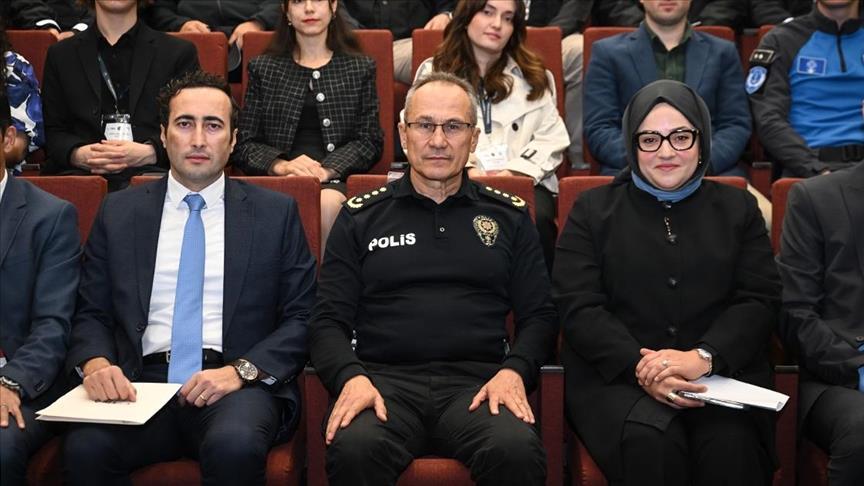A ceremony was held at the Police Academy Headquarters in Gölbaşı to commence the new term of the training.
In his speech, Police Academy Chief Superintendent Fatih İnal stated that women, children, and unarmed civilians are the greatest victims of war.
Drawing attention to the oppression and genocide in Gaza, İnal said, "Unfortunately, more than 250 journalists in Gaza were killed while pursuing the truth and reporting the news. What makes it even more painful is that they were targeted. I condemn those who committed this oppression, those who killed innocent children, women, and journalists. I hope there will be no more wars. I hope that children and women will no longer shed tears, and that our journalist friends will bring us good news."
Stating that the Police Academy is the most important brand value in the 180-year-old Police Force's education, İnal said that they would share the Police Force's experience and knowledge with the press in the program.
Noting that they aim to make journalists' lives easier while working under difficult conditions and to improve their survival skills, İnal continued:
"Difficult conditions do not always occur in war. Natural disasters, earthquakes, floods, and forest fires happen. Unfortunately, social unrest sometimes spirals out of control in countries. Journalists who want to report on these events, along with other participants, become victims of the violence there. In the program, we will discuss how journalists can manage their lives more easily and protect themselves while working in this field. It will be a tough training program. This is the only certified program of its kind in the world."

The training program will include many challenging and interesting training sessions, ranging from advanced driving techniques to map navigation, from explosive materials to survival in closed water bodies, from points to consider when intervening in social events to survival in nature, food procurement, shelter building, and kidnapping scenarios. and nighttime long-distance travel.
“The victims of genocide also include members of the press working in the field”
Uğur Tanyeli, TİKA's Head of Foreign Relations and Partnerships, said that they are organizing the last war journalism training of the year and that this year they selected journalists mainly from the Francophone region of Africa.
Tanyeli explained that TİKA has carried out many projects in friendly and fellow countries since its establishment, emphasizing that they attach great importance to investing in human capital in all sectors.

Pointing out that the greatest tragedy seen in recent years is the genocide in Gaza, Tanyeli said, "The victims of genocide also include members of the press working in the field. Nearly 250 members of the press lost their lives. Members of the press, whose rights are protected by international law and who we have been told have been protected for years, unfortunately also suffered their share of this tragedy, this genocide. Gaza has unfortunately become the world's largest press martyrdom site. In this regard, trainings will be provided by distinguished instructors from our Police Academy, AFAD, and the Turkish Armed Forces to help you better prepare for such conditions."
Over 16,000 journalists have been trained since 2012
AA Academy Manager Zeynep Bayramoğlu Öztürk also stated that they have completed 27 training terms, saying, "We are trying to make life easier for journalists, our colleagues, who will work in crisis areas and under difficult conditions. I hope you will never have to use this information. I hope you have the chance to both survive and carry out your journalism and reporting activities to the best of your ability in challenging conditions and war zones."

Öztürk explained that AA Academy was founded in 2012, saying, “We have provided 382 training programs from 2012 to 2024. We have trained over 16,000 journalists in these 382 training programs. We continue to revise and improve our programs. I hope this will be an educational and pleasant training for you.”
Twenty-four participants are enrolled in the program, including nine AA employees and 15 journalists from Djibouti, Tunisia, Senegal, Niger, Cameroon, the Democratic Republic of the Congo, Gabon, Chad, and the Republic of Guinea.
